By the time Eve Babitz was born in 1943, Hollywood was already well on its way to becoming a mythological bygone. Hollywood in a sense has always been a lost city, nostalgic for a grand sense of theatricality and romance which if it did not genuinely possess, it created on soundstages, in Spanish bungalows, and in the memories of the millions of faithful movie viewers who believed that it was, at one time, real.
Technicolor pink jacaranda blossoms float through the dry California air much like they did for Rudolph Valentino. The perfume of lemon blossoms is unchanged by time. And yet today it is impossible to stand on Hollywood Boulevard and in some way not feel disenchanted. The stars of Hollywood Blvd. are cracked, caked in grime and bubblegum. A man sleeps fitfully in the doorway of an abandoned movie palace. In Hollywood, glamour has always co-existed with suffering.
Eve Babitz lived in the intersection of the real and the illusion; her gift and her curse was the ability to hold both worlds within her writing, unified in her gaze. Which is to say, she saw Hollywood as only a woman born in Hollywood can do. A certain mix of inherited blasé cynicism, with a streak of native pride which is the keeper of the illusionary memories of Los Angeles.
“Though…Hollywood doesn’t exist, I firmly believe, however, that it did exist. And like Rome, we are living amidst the fallen columns and clothes-lined courtyards, in the ruins of an empire of the self-enchanted which was once, briefly, more devastating than Caesar’s and still brings respectable families to a hot, windy intersection in August to sigh with unnoticed despondence, ‘…Well…here we are…Hollywood and Vine.” (Babitz, Eve’s Hollywood)
1943: the year Eve Babitz was born, and the year Elinor Glyn died. Elinor Glyn, a name which has all but been blown away by the sands of time. Yet in the 1920s, there was arguably no more important woman for a woman to know.
Elinor Glyn was born Elinor Sutherland in the Channel Islands of England in 1864, to a dubiously aristocratic background. The specifics wouldn’t matter; she would become the kind of writer who wrote herself into being, as both the creator and the muse incarnate. She invented in her literary persona what she felt should have been true by right. Thus the dramas and the romances of her exquisitely singular life became her body of work. Where fact and fiction ran together, she left that up to her fascinated readers. That was the delight of reading a novel like Three Weeks, first published in 1907; it was rapturously beautiful, it was scandalous, and the story had the unmistakable glisten of the real, the art of the possible.
At the turn of the twentieth century, perhaps the scandal of Three Weeks was not that women contemplated fantasies of romance, but rather that a woman would claim ownership of her own personal experiences by writing them down and – most shocking of all – having them published. Elinor Glyn was considered a writer of romances, but she was also her own biographer. This combination made her uniquely powerful; she could write her perspective on a topic as intimate and forbidden as love and have it universally acknowledged. The heroines of her novels were not merely the recipients or subjects of ardor; the women characters of Elinor Glyn are the architects, critics, and directors of their own desires.
Even as Glyn transported readers of the early twentieth century by evoking the courtly notion of love as a spiritual union of souls (Guinevere, King Arthur, Lancelot and the rest), she ushered in modern perspectives on gender roles and feminism. The two ideals were woven together seamlessly, guided by a masterful, and nothing if not experienced, hand. In her 1936 autobiography Romantic Adventure, Glyn defined her philosophy:
‘The word Romance has been narrowed and cheapened in modern times until it has come to be thought of little account, and for many it no longer represents the beautiful and inspiring ideal that it has always meant, and still means for me. As I see it, the word ‘romantic’ represents the true opposite to the word ‘sordid’; romance is a spiritual disguise, created by the imagination, with which to envelop material happenings and desires, and thus bring them into greater harmony with the soul.”
Three Weeks became a bestselling novel, and more importantly, a rite of passage in the “informal” education of young women (and men) everywhere. It was adapted three times for the screen: in 1914, 1917, and finally in 1924, adapted and supervised by Glyn herself. Of the 1924 adaption, Glyn said in a 1923 interview,
“Three Weeks is my masterpiece. They must not be permitted to do with it what they did with my other stories given to the screen. That must not be. Already I have written the scenario, and it has every least bit of business. But none the less, I shall select my director carefully - and my cast. I have studied screen technique so that I have the right to right to complain if Three Weeks doesn’t come to the screen a beautiful and inspiring drama of great love.”
Even by contemporary standards, it is rare for an author to retain such complete creative control over her or his creations. And yet, such was the power of the aura of Elinor Glyn. From her success as a novelist and personality, Glyn went on to write screenplays for Metro-Goldwyn-Mayer, and eventually directed her own material. Her very name attached to a film lent a project an air of elegance, intelligence, and, for lack of a better word, sex appeal. In other words - she had “It.”
In fact, Elinor Glyn coined the expression “IT” with the publication of "It" and Other Stories (1927). She defined “it” as “that quality possessed by some few persons which draws all others with its magnetic life force. With it you will win all men if you are a woman—and all women if you are a man.” The concept of “IT” was a pivotal moment in gender expression, as by Glyn’s own explicit definition it could be used to describe a man or a woman. By framing sex appeal as a mystical, magnetic quality, Glyn elevated sexuality to the realm of the metaphysical, as well as identifying it as formidable instrument of social mobility. She achieved her ethos that desire, like courtly love, was instinctively beautiful, inherently noble, and a source of great power.
In 1957, Eve Babitz was a student at Hollywood High School. Her parents (mother Mae, an artist, and father Sol, a violinist contracted by 20th Century Fox), moved to Los Angeles in the 1930s. But Eve was a true daughter of the city. Like many women born in Los Angeles, she grew up quickly, raised on celluloid, strangeness, and danger. The summer of 1957, the year she turned fourteen, Eve read the autobiography of Elinor Glyn in her backyard. Her mother Mae photographed Eve that summer while reading, and while it may have been intended as nothing more than a mother photographing her daughter, the photo has an uncanny premonition-like quality to it. Eve is propped up on her elbows on a sun lounger, lying half in shadow and half in lucent sunshine. She looks up from her Elinor Glyn book with a mixed, curious gaze. She may be startled, or she may be trying to look mysterious, it’s difficult to tell. But very likely, she isn’t trying anything at all and just wants to read her adventure romances. An early chapter of Eve’s first book Eve’s Hollywood begins, “When I was 14, I began writing a book, my memoirs, entitled I Wouldn’t Raise My Kid in Hollywood.” It is no coincidence that Eve Babitz began writing her memoirs the same year she read Elinor Glyn’s autobiography. It may be not accident that her first book Eve’s Hollywood is part-memoir, part-novel, much like Elinor Glyn’s autobiography Romantic Adventure.
Elinor Glyn must have meant a great deal to fourteen year old Eve Babitz, a young woman who waited on the corner of Sunset Blvd. and Highland Ave. to be picked up from Hollywood High School. In the words of Elinor Glyn, young Eve Babitz could glimpse a future for herself, a life in which she was the self-made heroine of her own great adventure. Elinor Glyn promised to young women like Eve that their lives would be filled with excitement, mystique, fulfillment and purpose. That their heart pangs and aches were instinctively of interest, and that if one lead an interesting enough life, one could be a great writer. When Eve began writing her memoirs as a teenager, she included a story about hitchhiking. The memory itself is arresting in its potential danger, and yet it is the whimsical innocence of the author that is ultimately devastating:
“…I had let a spectacularly handsome man drive me home from a party I wasn’t allowed to go to, and when I told him I was 14, he dropped me off a block from my house and said, paternally, before he gave me an unpaternal and never-to-be-forgotten kiss, ‘Don’t let guys pick you up like this, kid, you might get hurt.’ After that I never saw him again except on the front page of the papers two years later when he was found dead in Lana Turner’s bathroom. He was called Johnny Stompanato, poor guy. I’d been writing that book sort of before that, but afterwards I began writing it for real. After that, I’ve always been writing it.” (Babitz, Eve’s Hollywood)
In the introduction of Three Weeks, Elinor Glyn defended her heroine, writing:
“If I were making the study of a Tiger, I would not give it the attributes of a spaniel, because the public, and I myself, might prefer a spaniel! I would still seek to portray accurately every minute instinct of that Tiger, to make a living picture. Thus, as you read, I want you to think of her as such a study. A great splendid nature, full of the passionate realization of […] instincts, immensely cultivated, polished, blasé.”
Eve Babitz, she may have trusted Elinor Glyn too much. She knew what all daughters of Hollywood know, which is that the 1920s paintings of courtly love that once decorated the walls of the Pig and Whistle on Hollywood Blvd. have been destroyed, unless you know where to look.
Eve Babitz knew exactly where to look.

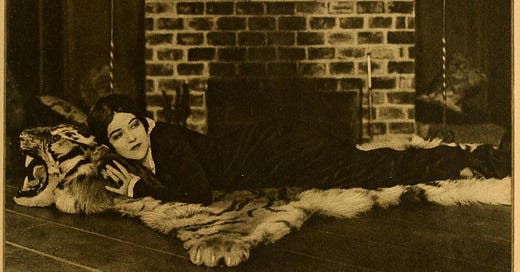





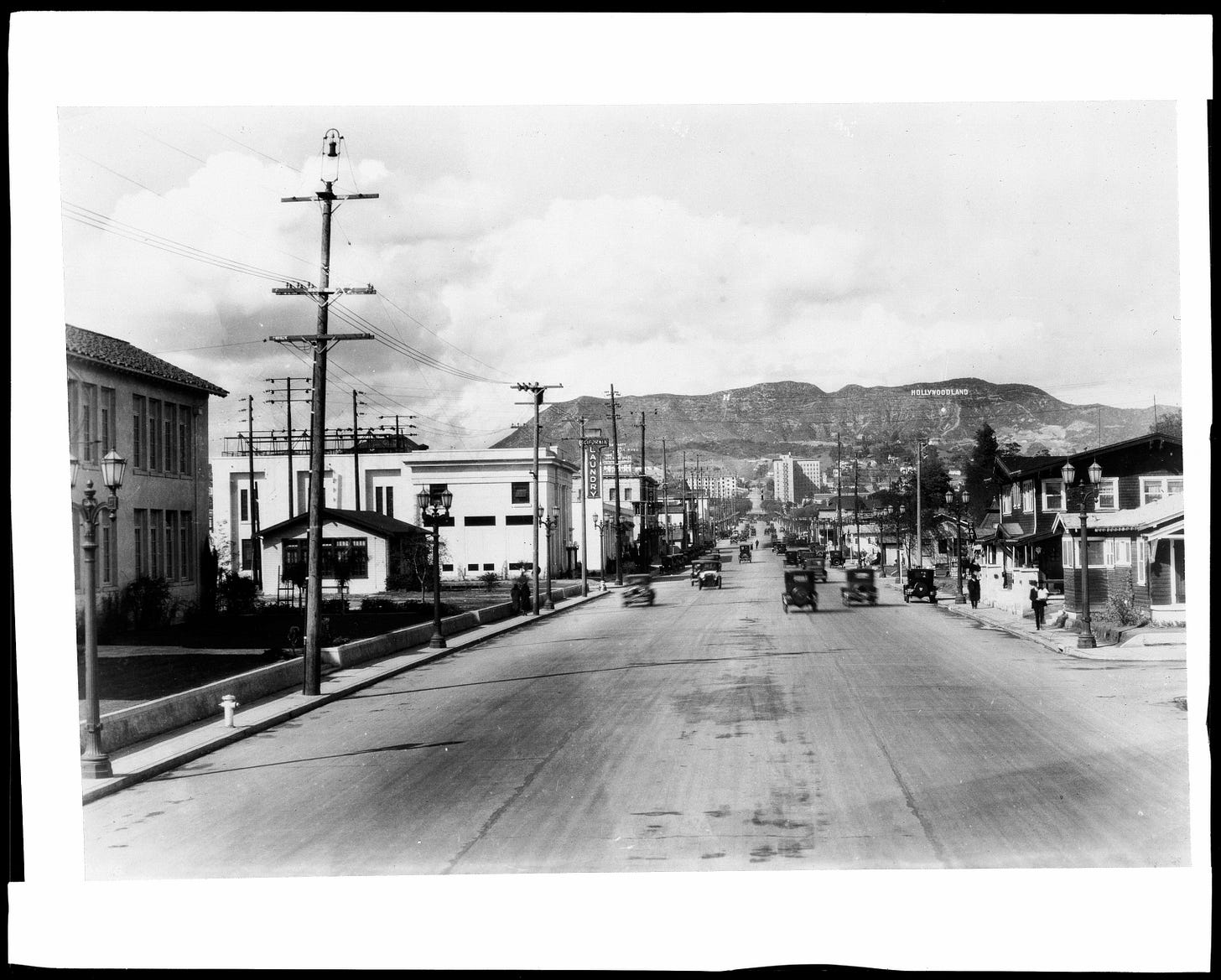
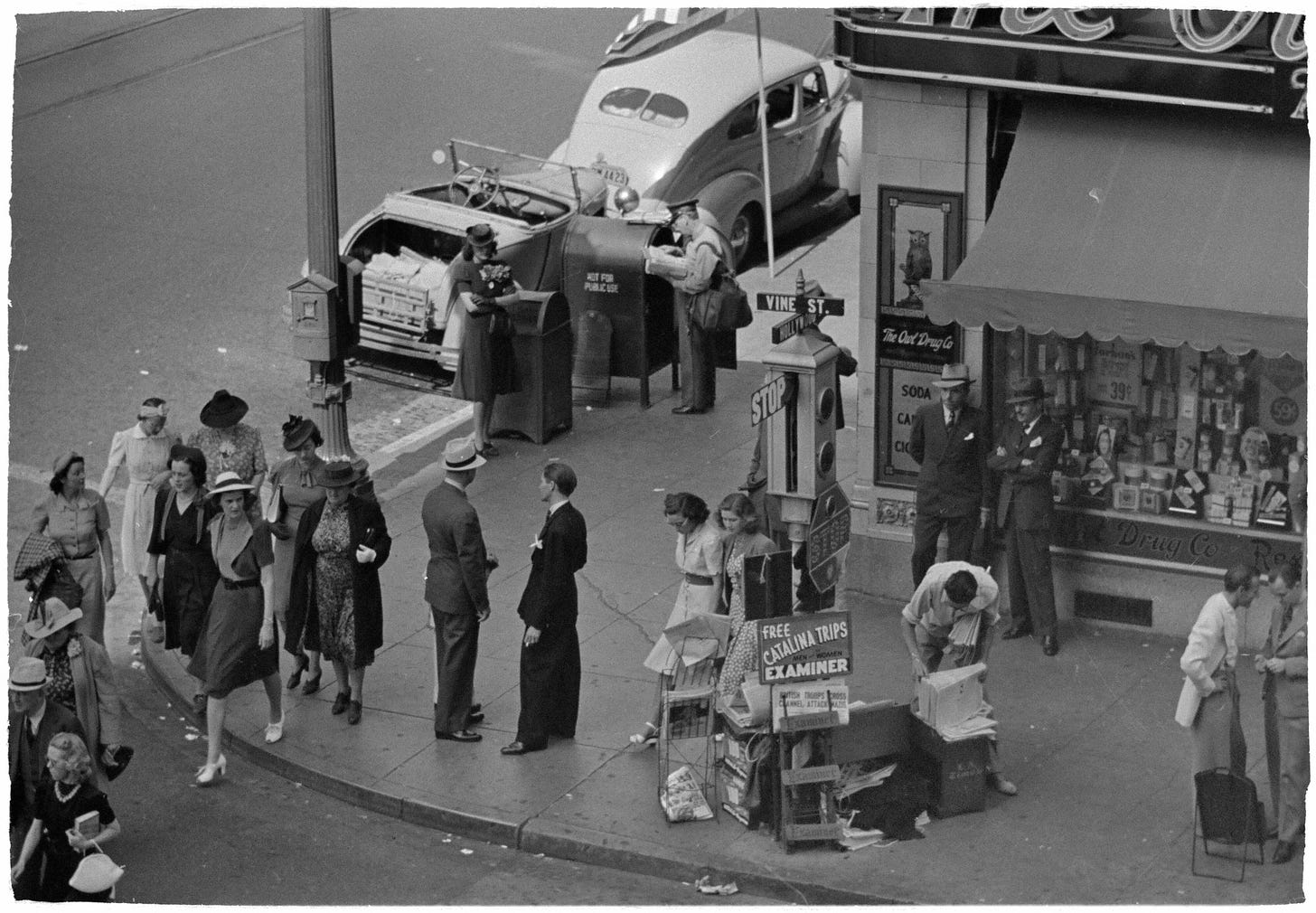
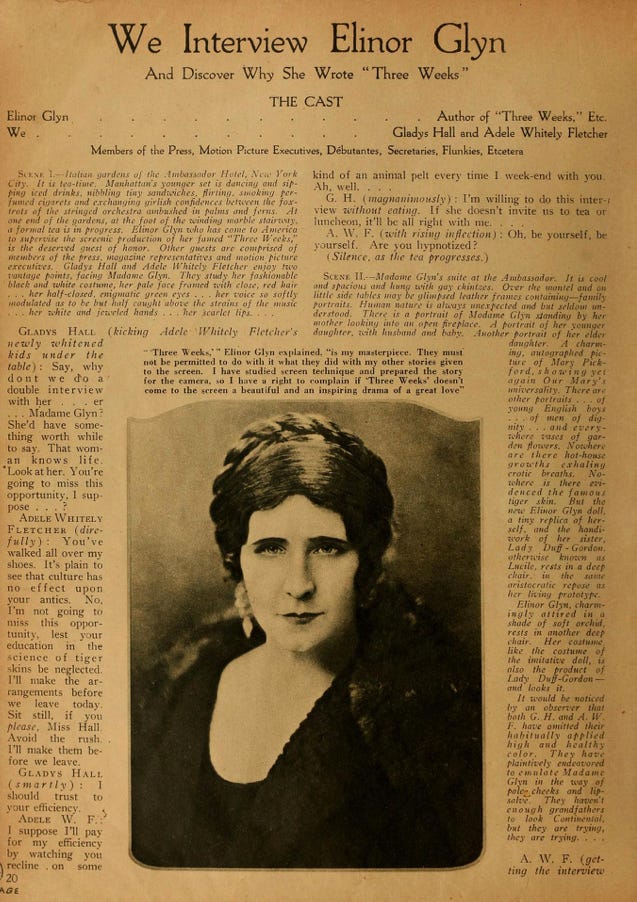
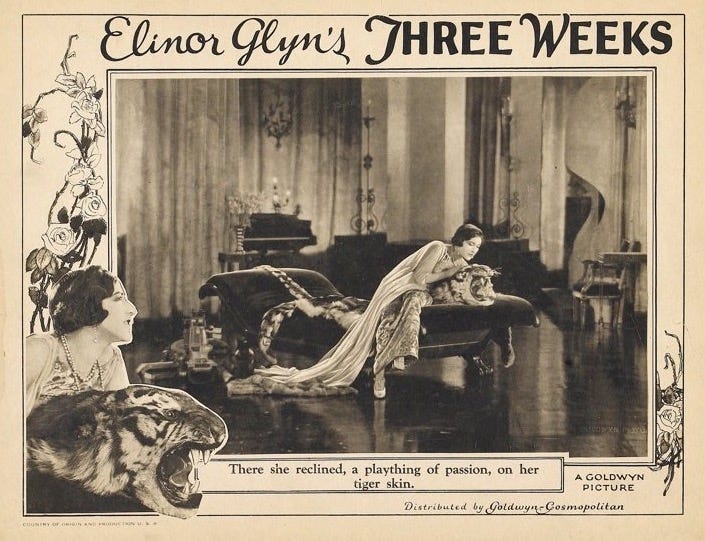
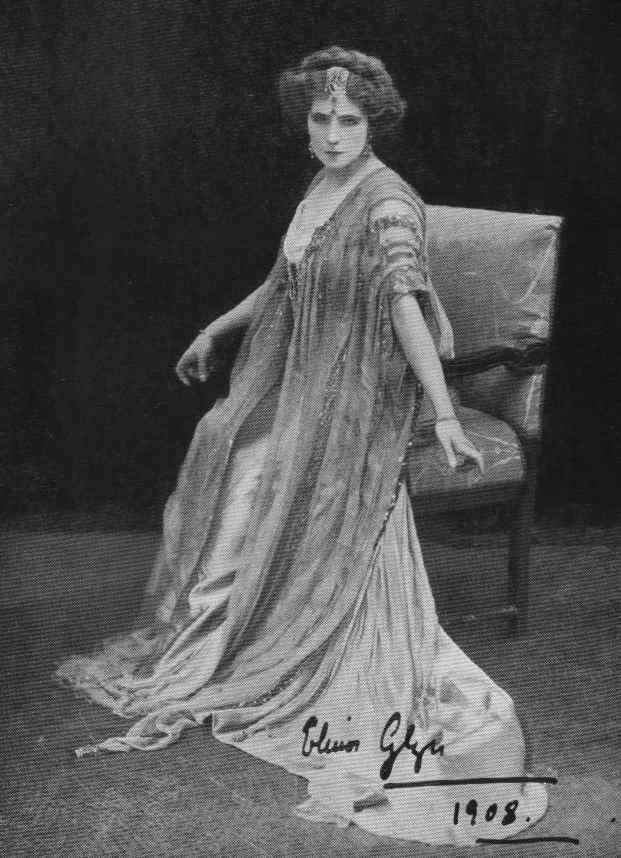

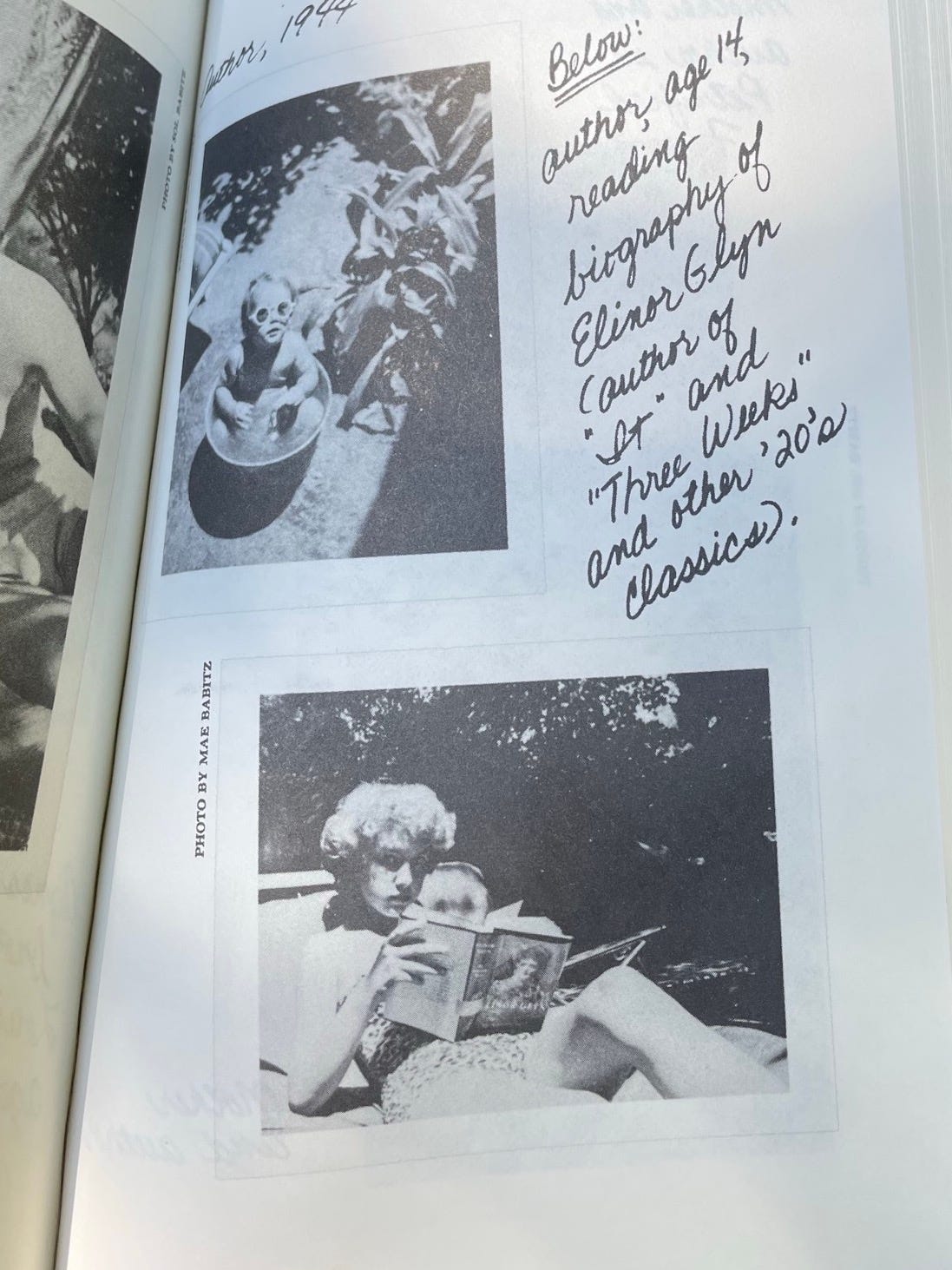

so clever of you to merge the stories / psyches of these two fabulous women writers ❤️🔥 Elinor Glyn & Eve Babitz forever!
I am late getting to this, but it is beautifully written. I feel as though it also ends on a bit of a cliffhanger - Is there more to look forward to on Eve Babitz?